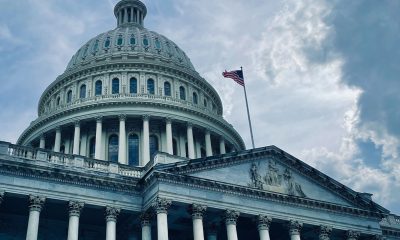Activism
Panel Discusses Supreme Court Case Threatening End of Affirmative Action
On Oct. 31, SCOTUS listened to oral arguments in two cases challenging race-conscious student admissions policies used by Harvard University and the University of North Carolina (UNC) to promote creating diverse student populations at their schools. The case emerged in 2014, when SFFA, a nonprofit advocacy organization opposed to affirmative action, brought an action alleging Harvard violated Title VI of the Civil Rights Act (Title VI).

By Antonio Ray Harvey | California Black Media
A webinar hosted by ChangeLawyers, the American Constitution Society (ACS) Bay Area, and Equal Justice Society was held Nov. 15 to discuss the possible outcomes of the pending decision by the Supreme Court of the United States (SCOTUS) in the case of Students for Fair Admissions (SFFA) v. Harvard.
The online event titled, “The End of Affirmative Action: How SCOTUS Is Coming After BIPOC Students” delved into the impact of banning the consideration of race as a factor during the college admissions process.
Black, Indigenous, and People of Color (BIPOC) students would be affected by such a ruling, said panelist Lisa Holder, an attorney and president of Equal Justice Society (EJS). EJS is an Oakland-based nonprofit and civil rights organization that does work geared toward transforming the nation’s consciousness on race through law, social sciences, and the arts.
“(Ending Affirmative Action) essentially, completely upends our ability to level the playing field and remediate for centuries of discrimination and marginalization,” said Holder. “If you do not have intervention and take affirmative steps to counteract continued systemic racism, it’s going to take hundreds of years to repair those gaps. It will not happen by itself.”
Holder is also a member of the California Task Force to Study and Develop Reparation Proposals for African Americans, a nine-member panel established after Gov. Gavin Newsom signed Assembly Bill 3121, authored by then-Assemblymember Shirley Weber. The task force is investigating the history and costs of slavery in California and is charged with recommending an appropriate remedy for the state to implement.
Also participating on the End of Affirmative Action panel were Sally Chen, education equity program manager at Chinese for Affirmative Action, and Sarah C. Zearfoss, senior assistant dean for the University of Michigan Law School.
Shilpa Ram — senior staff attorney for Education Equity, Public Advocates and a board member of the ACS Bay Area Lawyer Chapter — was the moderator.
On Oct. 31, SCOTUS listened to oral arguments in two cases challenging race-conscious student admissions policies used by Harvard University and the University of North Carolina (UNC) to promote creating diverse student populations at their schools.
The case emerged in 2014, when SFFA, a nonprofit advocacy organization opposed to affirmative action, brought an action alleging Harvard violated Title VI of the Civil Rights Act (Title VI).
SFFA argues that Harvard instituted a race-conscious admissions program that discriminated against Asian American applicants. SFFA also alleges that UNC is violating the Equal Protection Clause of the 14th Amendment, by unfairly using race to provide preference to underrepresented minority applicants to the detriment of white and Asian American applicants.
Chen, of Chinese for Affirmative Action, is a first-generation college graduate from a working-class immigrant family. She is an alumna of Harvard College. She was one of eight students and alumni that gave oral testimony in support of affirmative action in the 2018 federal lawsuit Students for Fair Admissions, Inc. v. Harvard.
“Particularly as these cases were taking advantage of a claim that Asian American students don’t benefit from Affirmative Action or are harmed; we really saw how this was a misrepresentation of our community needs,” Chen said of hers and seven other students’ testimonies. “My testimony really spoke to that direct experience and making clear that Asian American students and communities are in support of affirmative action.”
In 1965, President Lyndon B. Johnson issued Executive Order 11246, requiring all government contractors and subcontractors to take affirmative action to expand job opportunities for minorities.
Fifty-seven years later, a decision by SCOTUS could be reached at the end of the current term in late June or early July 2023 banning affirmative action. The decision would dismantle race-conscious admission policies that overwhelmingly help BIPOC students create a better future for themselves, members of the panel stated.
“Schools take race into account as a factor in admission because that is the single-best, most effective way to create a racially diverse class,” Zearfoss said.
Zearfoss directs the University of Michigan Law School Jurist Doctorate (JD) and Master of Law (LLM) admissions and supervises the Office of Financial Aid.
California ended affirmative action policies in 1996 with the passage of Proposition 209.
Prop 209 states that the government and public institutions cannot discriminate against or grant preferential treatment to persons based on race in public employment, public education, and public contracting.
Proposition 16 was a constitutional amendment designed to repeal Prop 209, but the initiative was defeated by voters in 2020. Secretary of State Dr. Shirley Weber introduced the legislation that was the basis for Prop 16 when she was a state Assemblymember for the 79th District.
“When we no longer live in a white supremacist society then we can start thinking about ending these interventions that are necessary to counteract preferences for white people that exist and continue to exist,” Holder said.
Activism
Oakland Post: Week of December 31, 2025 – January 6, 2026
The printed Weekly Edition of the Oakland Post: Week of – December 31, 2025 – January 6, 2026

To enlarge your view of this issue, use the slider, magnifying glass icon or full page icon in the lower right corner of the browser window.
Activism
Big God Ministry Gives Away Toys in Marin City
Pastor Hall also gave a message of encouragement to the crowd, thanking Jesus for the “best year of their lives.” He asked each of the children what they wanted to be when they grow up.

By Godfrey Lee
Big God Ministries, pastored by David Hall, gave toys to the children in Marin City on Monday, Dec. 15, on the lawn near the corner of Drake Avenue and Donahue Street.
Pastor Hall also gave a message of encouragement to the crowd, thanking Jesus for the “best year of their lives.” He asked each of the children what they wanted to be when they grew up.
Around 75 parents and children were there to receive the presents, which consisted mainly of Gideon Bibles, Cat in the Hat pillows, Barbie dolls, Tonka trucks, and Lego building sets.
A half dozen volunteers from the Big God Ministry, including Donnie Roary, helped to set up the tables for the toy giveaway. The worship music was sung by Ruby Friedman, Keri Carpenter, and Jake Monaghan, who also played the accordion.
Big God Ministries meets on Sundays at 10 a.m. at the Mill Valley Community Center, 180 Camino Alto, Mill Valley, CA Their phone number is (415) 797-2567.
Activism
First 5 Alameda County Distributes Over $8 Million in First Wave of Critical Relief Funds for Historically Underpaid Caregivers
“Family, Friend, and Neighbor caregivers are lifelines for so many children and families in Alameda County,” said Kristin Spanos, CEO, First 5 Alameda County. “Yet, they often go unrecognized and undercompensated for their labor and ability to give individualized, culturally connected care. At First 5, we support the conditions that allow families to thrive, and getting this money into the hands of these caregivers and families at a time of heightened financial stress for parents is part of that commitment.”

Family, Friend, and Neighbor Caregivers Can Now Opt Into $4,000 Grants to Help Bolster Economic Stability and Strengthen Early Learning Experiences
By Post Staff
Today, First 5 Alameda County announced the distribution of $4,000 relief grants to more than 2,000 Family, Friend, and Neighbor (FFN) caregivers, totaling over $8 million in the first round of funding. Over the full course of the funding initiative, First 5 Alameda County anticipates supporting over 3,000 FFN caregivers, who collectively care for an estimated 5,200 children across Alameda County. These grants are only a portion of the estimated $190 million being invested into expanding our early childcare system through direct caregiver relief to upcoming facilities, shelter, and long-term sustainability investments for providers fromMeasure C in its first year. This investment builds on the early rollout of Measure C and reflects a comprehensive, system-wide strategy to strengthen Alameda County’s early childhood ecosystem so families can rely on sustainable, accessible care,
These important caregivers provide child care in Alameda County to their relatives, friends, and neighbors. While public benefits continue to decrease for families, and inflation and the cost of living continue to rise, these grants provide direct economic support for FFN caregivers, whose wages have historically been very low or nonexistent, and very few of whom receive benefits. As families continue to face growing financial pressures, especially during the winter and holiday season, these grants will help these caregivers with living expenses such as rent, utilities, supplies, and food.
“Family, Friend, and Neighbor caregivers are lifelines for so many children and families in Alameda County,” said Kristin Spanos, CEO, First 5 Alameda County. “Yet, they often go unrecognized and undercompensated for their labor and ability to give individualized, culturally connected care. At First 5, we support the conditions that allow families to thrive, and getting this money into the hands of these caregivers and families at a time of heightened financial stress for parents is part of that commitment.”
The funding for these relief grants comes from Measure C, a local voter-approved sales tax in Alameda County that invests in young children, their families, communities, providers, and caregivers. Within the first year of First 5’s 5-Year Plan for Measure C, in addition to the relief grants to informal FFN caregivers, other significant investments will benefit licensed child care providers. These investments include over $40 million in Early Care and Education (ECE) Emergency Grants, which have already flowed to nearly 800 center-based and family child care providers. As part of First 5’s 5-Year Plan, preparations are also underway to distribute facilities grants early next year for child care providers who need to make urgent repairs or improvements, and to launch the Emergency Revolving Fund in Spring 2026 to support licensed child care providers in Alameda County who are at risk of closure.
The FFN Relief Grants recognize and support the essential work that an estimated 3,000 FFN caregivers provide to 5,200 children in Alameda County. There is still an opportunity to receive funds for FFN caregivers who have not yet received them.
In partnership with First 5 Alameda County, Child Care Payment Agencies play a critical role in identifying eligible caregivers and leading coordinated outreach efforts to ensure FFN caregivers are informed of and able to access these relief funds.FFN caregivers are eligible for the grant if they receive a child care payment from an Alameda County Child Care Payment Agency, 4Cs of Alameda County, BANANAS, Hively, and Davis Street, and are currently caring for a child 12 years old or younger in Alameda County. Additionally, FFN caregivers who provided care for a child 12 years or younger at any time since April 1, 2025, but are no longer doing so, are also eligible for the funds. Eligible caregivers are being contacted by their Child Care Payment Agency on a rolling basis, beginning with those who provided care between April and July 2025.
“This money is coming to me at a critical time of heightened economic strain,” said Jill Morton, a caregiver in Oakland, California. “Since I am a non-licensed childcare provider, I didn’t think I was eligible for this financial support. I was relieved that this money can help pay my rent, purchase learning materials for the children as well as enhance childcare, buy groceries and take care of grandchildren.”
Eligible FFN caregivers who provided care at any time between April 1, 2025 and July 31, 2025, who haven’t yet opted into the process, are encouraged to check their mail and email for an eligibility letter. Those who have cared for a child after this period should expect to receive communications from their child care payment agency in the coming months. FFN caregivers with questions may also contact the agency they work with to receive child care payments, or the First 5 Alameda help desk, Monday through Friday, from 9 a.m. to 5:00 p.m. PST, at 510-227-6964. The help desk will be closed 12/25/25 – 1/1/26. Additional grant payments will be made on a rolling basis as opt-ins are received by the four child care payment agencies in Alameda County.
Beginning in the second year of Measure C implementation, FFN caregivers who care for a child from birth to age five and receive an Alameda County subsidized voucher will get an additional $500 per month. This amounts to an annual increase of about $6,000 per child receiving a subsidy. Together with more Measure C funding expected to flow back into the community as part of First 5’s 5-Year Plan, investments will continue to become available in the coming year for addressing the needs of childcare providers in Alameda County.
About First 5 Alameda County
First 5 Alameda County builds the local childhood systems and supports needed to ensure our county’s youngest children are safe, healthy, and ready to succeed in school and life.
Our Mission
In partnership with the community, we support a county-wide continuous prevention and early intervention system that promotes optimal health and development, narrows disparities, and improves the lives of children from birth to age five and their families.
Our Vision
Every child in Alameda County will have optimal health, development, and well-being to reach their greatest potential.
Learn more at www.first5alameda.org.
-

 Bay Area4 weeks ago
Bay Area4 weeks agoPost Salon to Discuss Proposal to Bring Costco to Oakland Community meeting to be held at City Hall, Thursday, Dec. 18
-

 Activism4 weeks ago
Activism4 weeks agoMayor Lee, City Leaders Announce $334 Million Bond Sale for Affordable Housing, Roads, Park Renovations, Libraries and Senior Centers
-

 Activism4 weeks ago
Activism4 weeks agoOakland Post: Week of December 10 – 16, 2025
-

 Activism4 weeks ago
Activism4 weeks agoOakland School Board Grapples with Potential $100 Million Shortfall Next Year
-

 Arts and Culture4 weeks ago
Arts and Culture4 weeks agoFayeth Gardens Holds 3rd Annual Kwanzaa Celebration at Hayward City Hall on Dec. 28
-

 Activism3 weeks ago
Activism3 weeks ago2025 in Review: Seven Questions for Black Women’s Think Tank Founder Kellie Todd Griffin
-

 Advice4 weeks ago
Advice4 weeks agoCOMMENTARY: If You Don’t Want Your ‘Black Card’ Revoked, Watch What You Bring to Holiday Dinners
-

 Activism3 weeks ago
Activism3 weeks agoAnn Lowe: The Quiet Genius of American Couture




















































